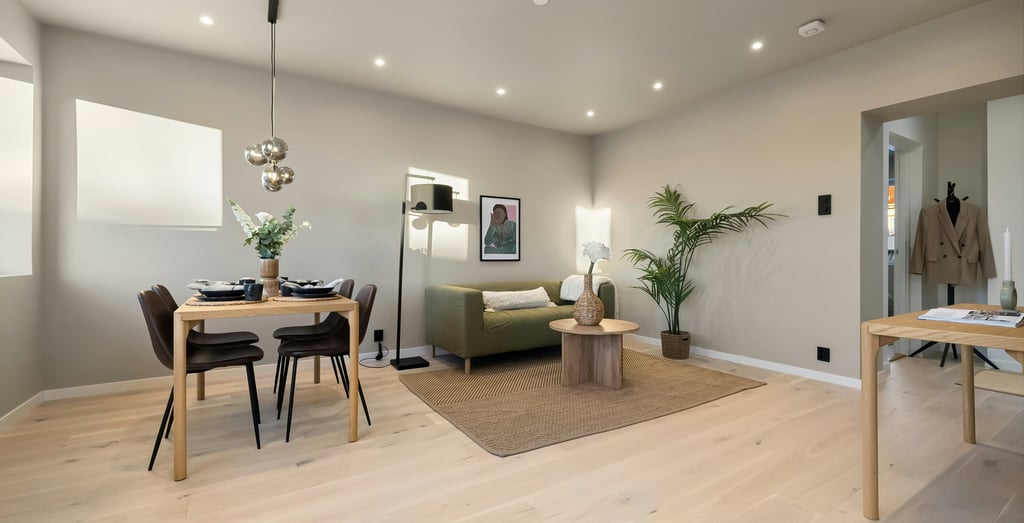🏡 How to Harmoniously Integrate Spaces: 7 Tips to Create Cozy and Functional Environments
Integrated spaces are the true reflection of modern living. They combine practicality, flow, and beauty in one place — everything we’re looking for, right? But blending environments without losing the identity of each space takes a careful eye and smart choices. In this post, you’ll learn how to harmoniously integrate different areas of your home, making the most of your space while creating a more functional, stylish, and personalized environment. Let’s dive in!
5/4/20252 min read


Why integrating spaces is a rising trend (and why it matters)
✨ More than aesthetics: it’s about lifestyle
The idea of integrated spaces comes from the need to connect convenience and togetherness. As homes and apartments become more compact, removing physical barriers helps visually expand the area, improve lighting, and make everyday interactions more fluid.
But it’s not just about square footage: it’s also about embracing a new way of living, where the kitchen, living room, or home office naturally flow into each other.
🛋 Benefits of integration
Sense of spaciousness and lightness
Better use of natural light
Improved circulation and functionality
More interaction between people in different areas
A more cohesive and stylish look
7 Tips to Harmoniously Integrate Spaces
1. Stick to a unified color palette
Using similar tones across different areas is one of the keys to visual flow. Not everything needs to match perfectly, but the colors should "speak" to one another. Neutrals with subtle pops of color work great.
2. Choose flooring that connects
Continuous flooring — like polished concrete, porcelain tiles, or wood — helps create a sense of unity. Avoid sudden changes in material from one room to the next.
3. Go for multifunctional furniture
Opt for pieces that serve more than one area, like a counter that divides the kitchen and living room, or open shelves that separate without isolating. They’re practical and add a nice decorative touch.
4. Use lighting to create flow
Use a consistent lighting design across spaces. Track lights, pendants, or spotlights can help define areas without breaking the visual connection.
5. Define zones without blocking the view
Rugs, open screens, or subtle level changes can define specific areas in open-plan homes while maintaining visual openness. The idea is to separate gently, without harsh lines.
6. Repeat design elements across rooms
Textures, materials, colors — use repeating elements to tie spaces together. Think of it like telling one story through different scenes.
7. Keep things organized
Since everything is in plain view, organization is key in integrated homes. Declutter often and hide what you don’t use to maintain a clean and harmonious look.
How to add personality without disrupting harmony
You don’t have to give up your personal style to enjoy a seamless space. In fact, it’s possible to blend character and cohesion beautifully.
🌿 Add meaningful decorative pieces
Photos, travel souvenirs, or a statement design piece stand out even more in clean, integrated spaces.
🪴 Play with textures and plants
Natural fabrics, wood, and greenery add warmth and depth without cluttering the look.
🎨 Mix styles — with intention
Yes, you can mix rustic with industrial. The trick is to do it thoughtfully, keeping visual coherence and avoiding overload.
Real-Life Inspiration for Integrated Spaces
🛋 Living Room + Kitchen
Use a kitchen island or counter to both separate and connect. Bar stools and a shared color palette bring harmony.
🛏 Bedroom + Home Office
Divide with an open bookcase or a light screen. Choose a stylish chair that blends with the room’s decor.
🌱 Balcony + Living Room
Keep the same flooring and open the glass doors. Add plants and cozy textures to make the balcony feel like an extension of your living space.
Conclusion
Integrating spaces isn’t just about tearing down walls. It’s about rethinking how you live, move, and connect in your home. With the right tips and smart choices, you can create a home that feels bigger, flows better, and reflects who you are — all with harmony.
© 2025 Dhomehub. All rights reserved.
